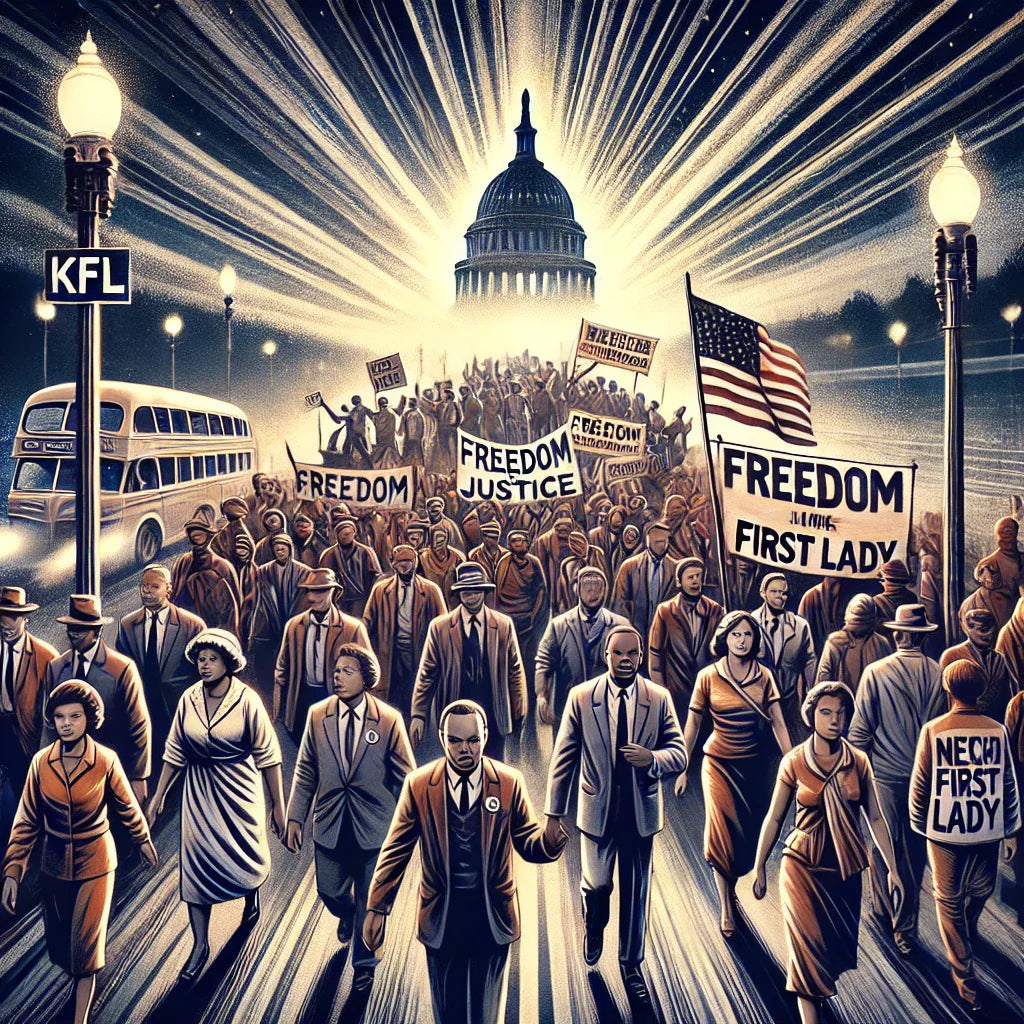
The Civil Rights Struggle: From Segregation to Equality
Share Label
For nearly a century after the abolition of slavery in 1865, African Americans continued to live under the weight of segregation and racial discrimination. The Jim Crow laws, established in the Southern United States, relegated them to second-class citizenship, denying them access to many fundamental rights. In the face of these injustices, a powerful and structured movement emerged: the Civil Rights Movement. Led by iconic figures like Martin Luther King Jr., Malcolm X, Rosa Parks, and Medgar Evers, this struggle transformed America and influenced justice movements around the world.
1. The Context of Racial Segregation
Despite the abolition of slavery in 1865 with the 13th Amendment, African Americans were still marginalized:
- Jim Crow laws enforced segregation in schools, transportation, restaurants, and public places.
- Voter suppression: African Americans were denied voting rights through taxes and literacy tests.
- Racial violence, particularly from the Ku Klux Klan, terrorized the Black community.
This oppressive system prompted activists to organize and demand their rights.
2. Early Revolts and the Emergence of the Movement
In the 1940s-1950s, several events marked the beginning of the resistance:
- 1947: Freedom Riders → Black and white activists traveled together on interstate buses to challenge segregation.
- 1954: Brown v. Board of Education → The U.S. Supreme Court declared school segregation unconstitutional.
- 1955: Rosa Parks → She refused to give up her seat to a white passenger, triggering the Montgomery Bus Boycott, led by Martin Luther King Jr.
These events strengthened mobilization and marked the beginning of large-scale protests.
3. Martin Luther King Jr. and Nonviolence
One of the most prominent figures of the movement, Martin Luther King Jr. advocated for a peaceful struggle inspired by Gandhi:
- 1963: March on Washington → He delivered his famous “I Have a Dream” speech to 250,000 people.
- 1964: Civil Rights Act → This historic law banned segregation and racial discrimination.
- 1965: Voting Rights Act → Ensured voting rights for African Americans.
His commitment earned him the Nobel Peace Prize in 1964, but also many enemies. He was assassinated in 1968 in Memphis.
4. Malcolm X and the Radicalization of the Movement
Unlike Martin Luther King Jr., Malcolm X took a more radical approach:
- A member of the Nation of Islam, he advocated for the separation of Blacks and Whites and defended self-defense.
- He criticized nonviolence and accused White people of being responsible for Black oppression.
- In 1964, he broke away from the Nation of Islam and called for a more universal struggle after his pilgrimage to Mecca.
- He was assassinated in 1965, leaving behind a revolutionary legacy and influencing the Black Power movement.
5. Major Victories of the Movement
Thanks to the sacrifices of activists, several historic victories were achieved:
- 1964: Civil Rights Act → Ended segregation in public places.
- 1965: Voting Rights Act → Removed voting restrictions for African Americans.
- 1968: Fair Housing Act → Banned discrimination in housing.
- Integration of African Americans into politics and society → Election of Barack Obama in 2008 as the first Black U.S. President.
6. Legacy and Global Impact
The Civil Rights Movement had an impact far beyond the United States:
- It inspired the fight against apartheid in South Africa.
- It influenced Pan-Africanist movements and decolonization struggles in Africa.
- The Black Lives Matter movement, born in 2013, continues this legacy by challenging police violence and racial injustice.
Conclusion
The Civil Rights Struggle transformed America and marked a pivotal moment in human history. This courageous and determined fight broke down legal barriers of segregation and paved the way for greater equality. However, racial inequalities persist today, and the spirit of the movement continues to inspire new generations fighting for justice and equity. The story of these activists serves as a crucial reminder: no right is ever guaranteed without struggle.









